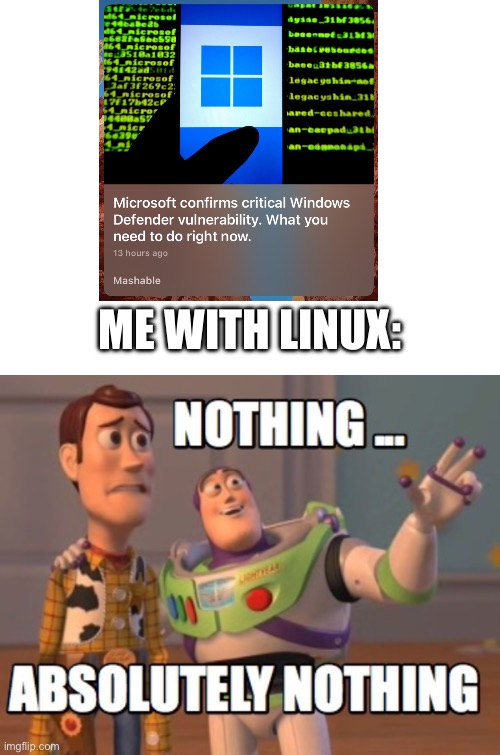this post was submitted on 17 Dec 2024
384 points (85.7% liked)
linuxmemes
24878 readers
319 users here now
Hint: :q!
Sister communities:
Community rules (click to expand)
1. Follow the site-wide rules
- Instance-wide TOS: https://legal.lemmy.world/tos/
- Lemmy code of conduct: https://join-lemmy.org/docs/code_of_conduct.html
2. Be civil
- Understand the difference between a joke and an insult.
- Do not harrass or attack users for any reason. This includes using blanket terms, like "every user of thing".
- Don't get baited into back-and-forth insults. We are not animals.
- Leave remarks of "peasantry" to the PCMR community. If you dislike an OS/service/application, attack the thing you dislike, not the individuals who use it. Some people may not have a choice.
- Bigotry will not be tolerated.
3. Post Linux-related content
- Including Unix and BSD.
- Non-Linux content is acceptable as long as it makes a reference to Linux. For example, the poorly made mockery of
sudoin Windows. - No porn, no politics, no trolling or ragebaiting.
4. No recent reposts
- Everybody uses Arch btw, can't quit Vim, <loves/tolerates/hates> systemd, and wants to interject for a moment. You can stop now.
5. 🇬🇧 Language/язык/Sprache
- This is primarily an English-speaking community. 🇬🇧🇦🇺🇺🇸
- Comments written in other languages are allowed.
- The substance of a post should be comprehensible for people who only speak English.
- Titles and post bodies written in other languages will be allowed, but only as long as the above rule is observed.
6. (NEW!) Regarding public figures
We all have our opinions, and certain public figures can be divisive. Keep in mind that this is a community for memes and light-hearted fun, not for airing grievances or leveling accusations. - Keep discussions polite and free of disparagement.
- We are never in possession of all of the facts. Defamatory comments will not be tolerated.
- Discussions that get too heated will be locked and offending comments removed.
Please report posts and comments that break these rules!
Important: never execute code or follow advice that you don't understand or can't verify, especially here. The word of the day is credibility. This is a meme community -- even the most helpful comments might just be shitposts that can damage your system. Be aware, be smart, don't remove France.
founded 2 years ago
MODERATORS
you are viewing a single comment's thread
view the rest of the comments
view the rest of the comments

Bootkitty?
However,
you can already patch your BIOS to become secure again! :)
All in all, Windows security is a joke compared to Linux's.
bootkitty wasn't implemented ever and if you use GUID Partition Table and your bios is set to uefi without csm, it can't affect you, since Bootkitty embeds itself into the Master Boot Record and there exploits the LogoFail vulrenability (this was already patched btw) with as far as i remember, a self-extracting steganographical bitmap image for arbritary code execution to bypass Secure Boot with injecting face certifications to Moklist. Also, it only runs on select devices, far from all Linux systems are vulrenabe.
Yeah, Linux has SELinux, that thing everyone turns off!
I want a Linux system that is entirely rootless by leveraging containers and service accounts.
Think about it. Instead of having root you could just have a utility that connects to a daemon that is in a sandboxed environment.
And AppArmor
Windows security is... fine? It could be better, but it's pretty much on par with linux security. Both have their vulns, but they're both also able to be secured enough that most (if not all) major data breaches are via phishing or other social engineering attacks, not solely software exploits. There's lots of fodder for the Linux vs. M$ debate, but this one is maybe a bit out of date.
If you actually dig deeper into the Linux security topic, you'd find out that Linux is actually not very secure. GrapheneOS developers made quite a lot of posts on what Linux distros (and the kernel) are missing in terms of security. A lot of "Linux security and the lack of viruses" rides on the waves of "there is hardly any point of creating malware for a system with such a small user base, plus you have to consider the fact that people knowledgeable enough just to install a Linux distro would be a bit more careful about their computers than the average Joe".
Actually the whole world runs on linux, Windows is mostly the low level consumer end.
Which makes your argument true for a certain segment of malware (the cheap low tech stuff more akin to scams etc targeting people en mass but expected to have a low return), but not actually for the parts where the money is that justify elaborate malware and hacks.
The internet runs on linux.
(Webservers, some network equipment, monitoring servers, NAS, DNS, ... lots of services can be setup and ran for free on linux. ((Companies like free)))
A lot of companies stuff also runs on linux when it's not free, just so they can avoid having to manage the hardware side... see: Google Cloud, AWS, Azure etc.
The amount of companies having their whole infrastructure run by one of the big cloud services on linux servers nowadays is far too high to make a serious argument of "linux is only secure because it's irrelevant and no one cares to break it".
Most companies like free. Larger companies like support contracts and shifting liability.